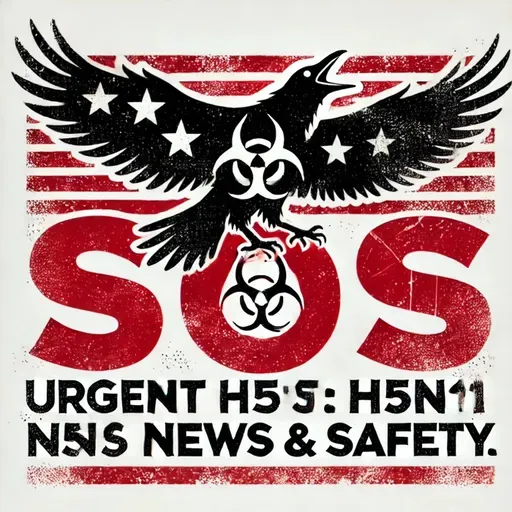
10 September 2025
H5N1 Bird Flu Outbreak Intensifies: CDC Warns of Rising Infections in Humans and Animals Across United States
Bird Flu SOS: Urgent H5N1 News & Safety
About
This is Bird Flu SOS: Urgent H5N1 News & Safety—a special emergency update on a rapidly developing public health threat.
Today, the Centers for Disease Control and Prevention and state health officials are reporting a significant surge in H5N1 bird flu cases, with the United States seeing record numbers of infections among both animals and humans. In the past month alone, new outbreaks have been confirmed in dairy herds across Arizona, Pennsylvania, and California. Human cases, previously rare, are now being documented at a rate unprecedented in the history of this virus according to the CDC and the latest surveillance reports. Since August, over 70 human cases have been confirmed in the US, with the first fatality unfortunately reported earlier this year—a clear indication that the public health impact is intensifying.
Dr. Maria Evans from the CDC emphasizes, "Every confirmed infection is an opportunity for this virus to adapt further to human hosts. Our urgent priority is to contain animal outbreaks and protect those most at risk, especially farm and dairy workers.” The World Health Organization echoes this warning, noting that the virus's ability to infect mammals puts us at heightened risk for potential human-to-human spread, which would dramatically escalate the global emergency.
Right now, all listeners in affected regions must take immediate precautionary steps. If you work on or visit dairy farms or poultry operations, wear gloves and masks at all times, avoid direct contact with sick or dead animals, and rigorously wash hands after any possible exposure. For backyard poultry owners, keep birds contained, avoid sharing equipment with neighbors, and disinfect housing and tools regularly. Anyone handling wild birds for research or rehabilitation should double down on protective gear and hygiene.
Pay close attention to warning signs in yourself and your animals. For people, sudden high fever, cough, severe headache, shortness of breath, or eye infection after being around birds or livestock require immediate medical attention. In animals, unexplained deaths, drop in milk production, or neurological symptoms—like muscle tremors—should be reported to your local veterinarian immediately. Quick isolation of affected animals and swift reporting can prevent further spread.
For emergency help, reach out immediately to your state’s health department, the CDC hotline, or the USDA Animal and Plant Health Inspection Service—resources are standing by 24/7 to assist with medical guidance, diagnostic support, and containment.
While it’s important to act urgently, public health authorities like the CDC and Johns Hopkins University stress that panic is not warranted. General community risk remains low for now, but the evolving pattern of infection demands vigilance from everyone, not complacency. Stay informed through official updates and follow all public health guidance.
Thank you for tuning in to Bird Flu SOS. Stay calm, stay safe, and make sure you return next week for the latest updates. This has been a Quiet Please production. For more, visit QuietPlease dot A I.
For more http://www.quietplease.ai
Get the best deals https://amzn.to/3ODvOta
Today, the Centers for Disease Control and Prevention and state health officials are reporting a significant surge in H5N1 bird flu cases, with the United States seeing record numbers of infections among both animals and humans. In the past month alone, new outbreaks have been confirmed in dairy herds across Arizona, Pennsylvania, and California. Human cases, previously rare, are now being documented at a rate unprecedented in the history of this virus according to the CDC and the latest surveillance reports. Since August, over 70 human cases have been confirmed in the US, with the first fatality unfortunately reported earlier this year—a clear indication that the public health impact is intensifying.
Dr. Maria Evans from the CDC emphasizes, "Every confirmed infection is an opportunity for this virus to adapt further to human hosts. Our urgent priority is to contain animal outbreaks and protect those most at risk, especially farm and dairy workers.” The World Health Organization echoes this warning, noting that the virus's ability to infect mammals puts us at heightened risk for potential human-to-human spread, which would dramatically escalate the global emergency.
Right now, all listeners in affected regions must take immediate precautionary steps. If you work on or visit dairy farms or poultry operations, wear gloves and masks at all times, avoid direct contact with sick or dead animals, and rigorously wash hands after any possible exposure. For backyard poultry owners, keep birds contained, avoid sharing equipment with neighbors, and disinfect housing and tools regularly. Anyone handling wild birds for research or rehabilitation should double down on protective gear and hygiene.
Pay close attention to warning signs in yourself and your animals. For people, sudden high fever, cough, severe headache, shortness of breath, or eye infection after being around birds or livestock require immediate medical attention. In animals, unexplained deaths, drop in milk production, or neurological symptoms—like muscle tremors—should be reported to your local veterinarian immediately. Quick isolation of affected animals and swift reporting can prevent further spread.
For emergency help, reach out immediately to your state’s health department, the CDC hotline, or the USDA Animal and Plant Health Inspection Service—resources are standing by 24/7 to assist with medical guidance, diagnostic support, and containment.
While it’s important to act urgently, public health authorities like the CDC and Johns Hopkins University stress that panic is not warranted. General community risk remains low for now, but the evolving pattern of infection demands vigilance from everyone, not complacency. Stay informed through official updates and follow all public health guidance.
Thank you for tuning in to Bird Flu SOS. Stay calm, stay safe, and make sure you return next week for the latest updates. This has been a Quiet Please production. For more, visit QuietPlease dot A I.
For more http://www.quietplease.ai
Get the best deals https://amzn.to/3ODvOta